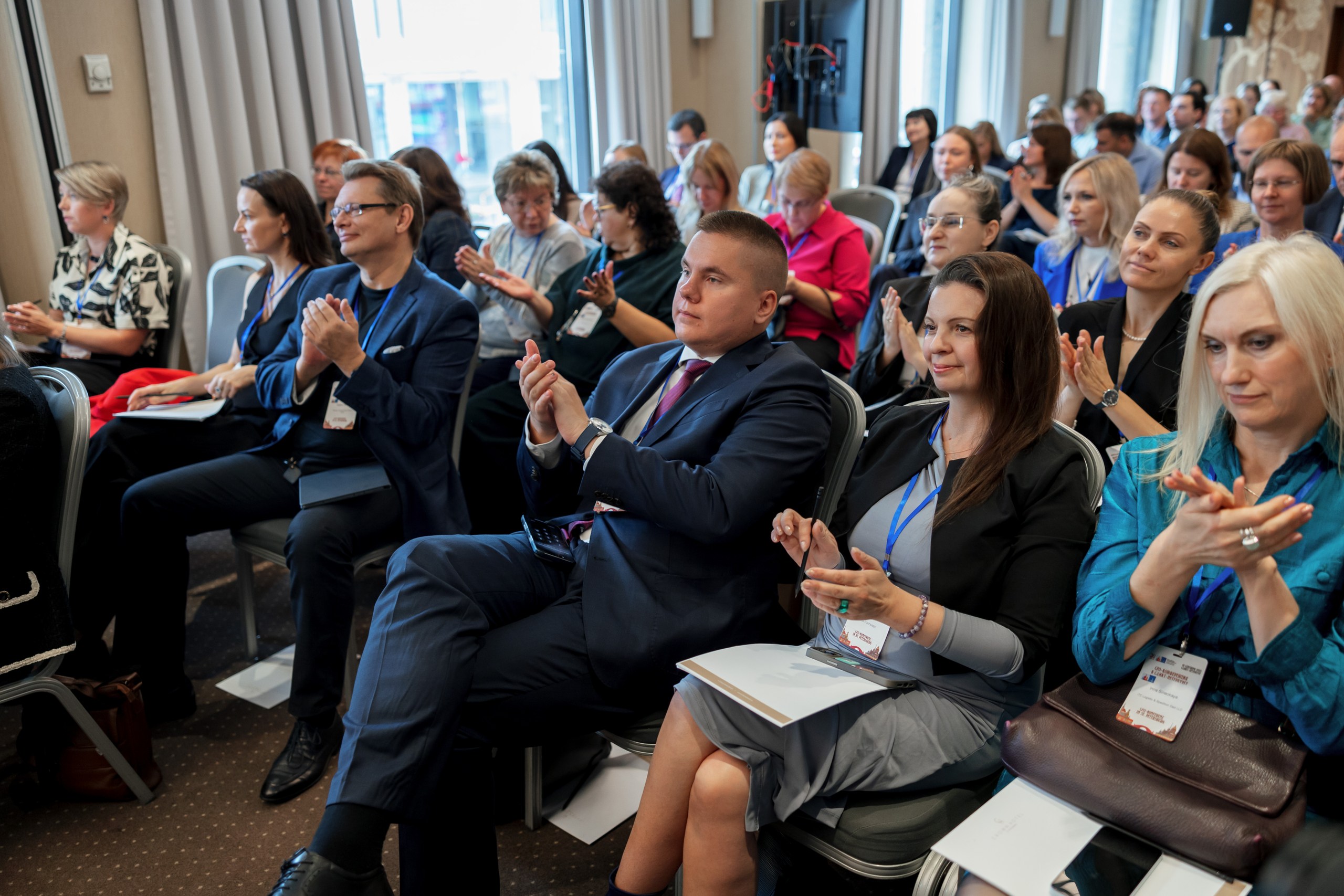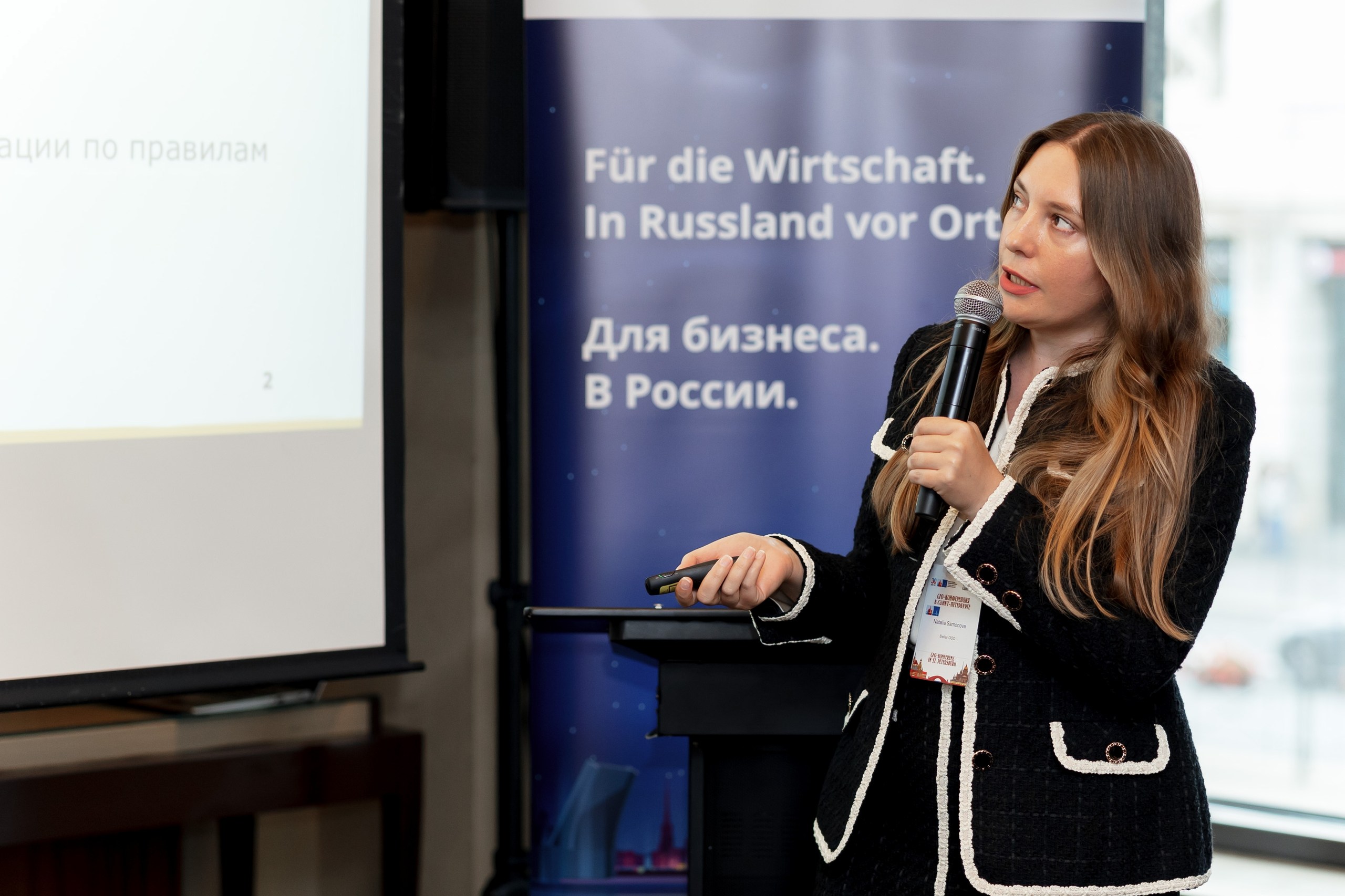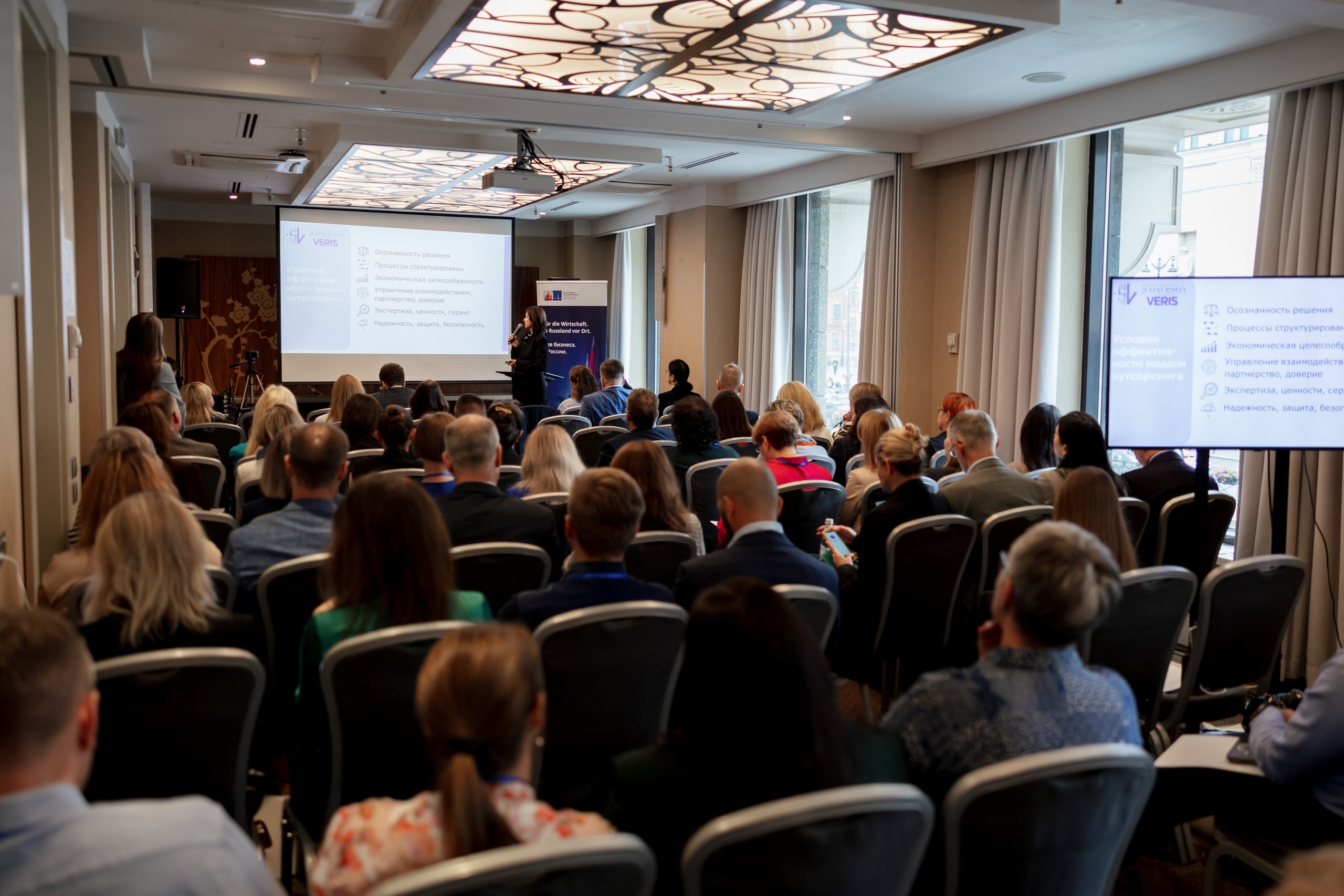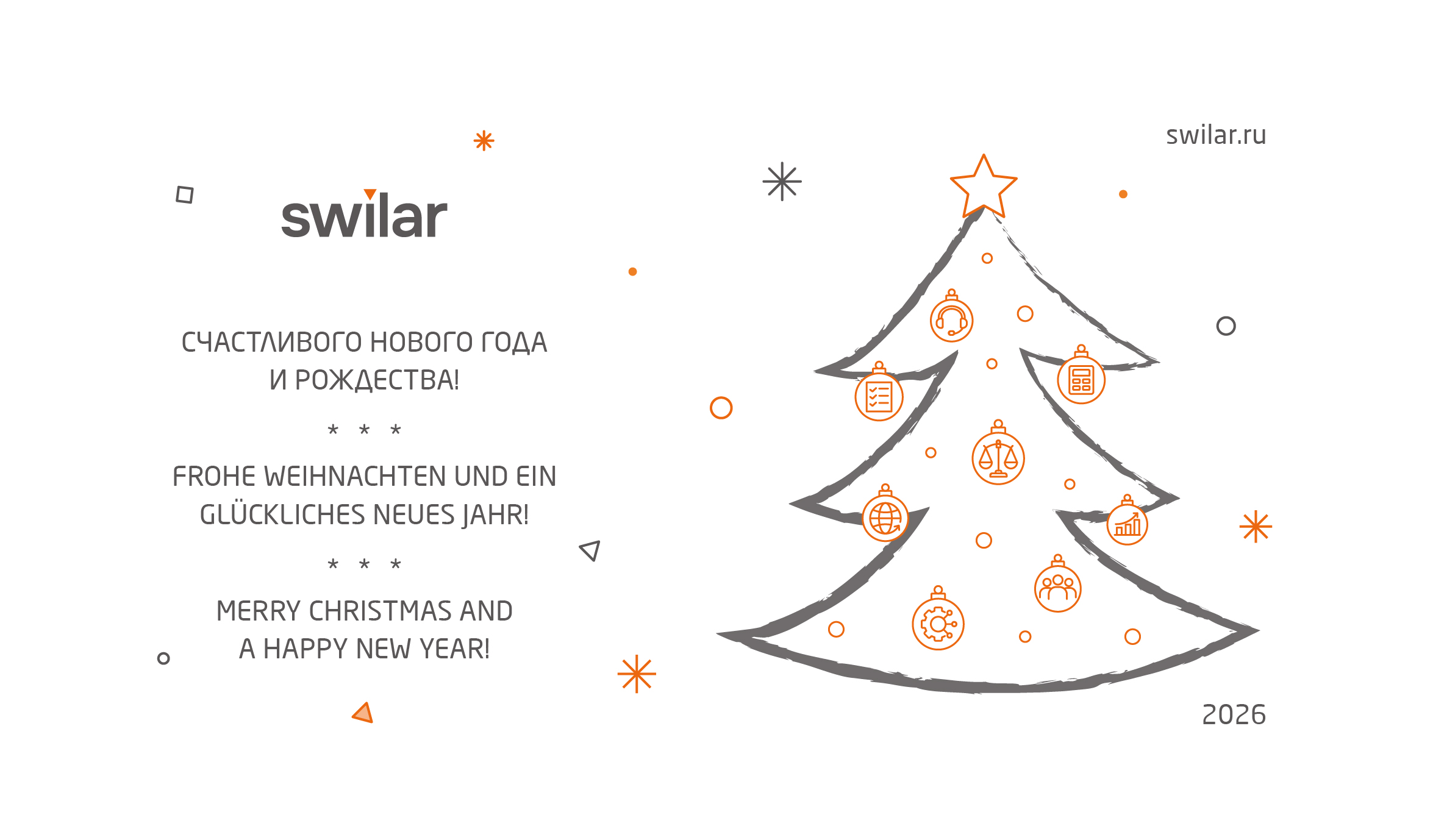Category: Taxes
Swilar expert spoke at the CFO Conference in St. Petersburg on tax optimisation
At the end of September, St. Petersburg hosted a CFO Conference that brought together finance directors and senior executives to discuss current issues in financial management. Swilar was represented by Natalia Samonova, Head of Controlling Projects, who delivered a talk on tax optimisation and government support for business.
Natalia covered lawful methods to reduce the tax burden and leverage state support measures, highlighted typical mistakes companies make when modelling tax expenses, and shared practical optimisation techniques, with special attention to criteria for choosing an effective tax regime.
A separate section of the presentation focused on opportunities offered by Special Economic Zones (SEZs) and Territories of Advanced Development (TADs). The expert outlined available tax incentives, entry conditions, and key pitfalls to consider.
In conclusion, Natalia Samonova emphasized there is no one-size-fits-all solution in tax optimisation: “An effective structure is the one that best matches a company’s specific goals and parameters.” She demonstrated approaches to assessing efficiency with illustrative calculations.
Swilar has many years of expertise in financial advisory and cost-management systems, including practical experience with SEZs and TADs. If you need assistance in selecting the optimal tax regime or evaluating the potential of government support for your business, we will be glad to advise you.



Other news

10.02.2026
Environmental Fee: what changed since January 1, 2026 and what business should expect

23.12.2025
Dear colleagues, Please accept our sincere congratulations on the upcoming New Year and Christmas!
Notice of participation in an international group of companies: procedure and deadlines
Dear colleagues,
This is a reminder that the deadline for submitting Notice of Participation in an International Group of Companies (hereinafter, the “IGC”) is August 31, 2025, for groups whose financial year coincides with the calendar year.
Filing the notice is an obligation for Russian organizations and foreign companies that recognize themselves as tax residents of Russia, which are part of an IGC and meet the criteria defined in article 105/16-1 of the RF Tax Code.
Below, we detail the key requirements, deadlines, and content of this notice.
1. The notice must be submitted by all IGC participants that are taxpayers in Russia, except for foreign organizations that only receive income specified in article 309 of the RF Tax Code (e.g., dividends, interest on debt obligations, etc.).
2. Exemption from the obligation
Exemption from the obligation to file the notice is provided in the following cases:


3. Filing deadline
The notice must be submitted electronically no later than eight months from the end of the reporting period of the IGC’s parent company (article 105.16-2 of the RF Tax Code). For example, if the reporting period ends on December 31, the filing deadline is August 31 of the following year.
4. Content of the notice
The notice must include the following information as of the end of the reporting period:






5. Notice format
Notices must be submitted to the tax authorities electronically in XML format, in accordance with the current form established by Order No. ММВ-7-17/124@ of the Federal Tax Service of Russia dated March 6, 2018 (as amended on July 16, 2020) “On Approval of the Format of the Notice of Participation in an International Group of Companies, the Procedure for its Completion and Submission in Electronic Form“.
6. Correcting errors in the notice
If errors or incomplete information are discovered, the taxpayer has the right to submit an amended notice. If this is done before the tax service discovers the inaccuracy, the participant is exempt from liability under article 129.9 of the RF Tax Code.
7. Liability for failure to file the notice
Failure to submit the notice by the deadline or submission of inaccurate information entails a fine of 500,000 rubles for each violation.
Practical recommendations:



Conclusion
Submitting a notice of participation in an IGC is an important responsibility of members of international groups. Compliance with the deadlines and requirements for the content of the notice will help to avoid fines and claims from tax authorities.
Submit a request
Other news

10.02.2026
Environmental Fee: what changed since January 1, 2026 and what business should expect

23.12.2025
Dear colleagues, Please accept our sincere congratulations on the upcoming New Year and Christmas!
Tax monitoring: procedure and conditions for switching to it
Dear colleagues,
In 2025, tax monitoring continues to gain popularity: approximately 740 companies from more than 20 industries already use tax monitoring, another 143 companies plan to join the project and a total of more than 13,000 companies comply with the program criteria (according to the portal https://налоговыймониторинг.рф/).
Recently, we have noticed growing interest to this topic in the business community and in this review we have compiled answers to the most frequently asked questions about the procedure and conditions for applying the tax monitoring regime.
Tax monitoring is a special form of tax control, a method of extended information exchange, whereby an organization provides the tax authority with real time access to its accounting and tax records.
What are the advantages of tax monitoring?
- this type of tax control allows you to forget about traditional audits by the Federal Tax Service.
- no penalties or fines if you follow the reasoned opinion.
- you can find out about existing errors and discrepancies identified by the Federal Tax Service in real time.
Methods of information exchange:
- providing access to the organization’s information systems;
- by telecommunication channels through an electronic document management operator (until 01.01.2026, the Article 6 of the Federal Law No. 389-FZ of 31.07.2023);
- providing access to an analytical datamart.
An organization is eligible to apply tax monitoring if it complies with all of the following criteria (clause 3 of the Article 105.26 of the Tax Code):
- the total amount of taxes for the previous year was at least RUB 80 million (VAT, excise taxes, personal income tax, income tax, mineral extraction tax, insurance contributions are added up, except for VAT and excise taxes, which are paid when goods are moved across the customs border of the EAEU);
- income according to accounting (financial statements) for the previous year is at least RUB 800 million;
- the book value of assets as of 31 December of the previous year is at least RUB 800 million.
Important: compliance with one or two conditions does not entitle a business entity to apply tax monitoring. All three conditions are to be fulfilled.
There are exceptions to every rule, so compliance with the above conditions is not required for organizations specified in the clause 3.1 of the Article 105.26 of the Tax Code of the Russian Federation:
- residents of advanced development territories (ADTs),
- participants in industrial clusters,
- residents of special economic zones,
- former members of consolidated groups of taxpayers,
- state and municipal institutions, lottery operators.
It is also important to note that on April 29, 2025 the Ministry of Finance published draft amendments to the Tax Code (02/04/01-25/00154001), which include measures to improve tax monitoring.
The Ministry of Finance experts have proposed to weaken the requirements: in order to switch to tax monitoring, it will be necessary to comply with at least one of the criteria, for example, in terms of asset value, income or the amount of taxes paid.
The switch to tax monitoring is voluntary. If your company complies with all of the above criteria, in order to participate you are to submit an application not later than September 1 of the year (clause 1 of the Article 105.27 of the Tax Code of the Russian Federation) preceding the year of introduction of monitoring, including:
- regulations for information exchange (Appendix No. 7, the Order of the Federal Tax Service of Russia dated 11 May 2021 No. ED-7-23/476),
- information of the related parties — organizations and individuals who directly or indirectly participate in the organization and whose share of participation exceeds 25%,
- tax accounting policy for the current year,
- documents regulating the organization’s internal control system (ICS) (Appendix No. 13, the Order of the Federal Tax Service of Russia dated 11 May 2021 No. ED-7-23/476).
Until November 1 inspectors review the materials received and decide whether to perform tax monitoring or to refuse it, indicating the reasons for the refusal. Possible reasons for refusal are specified in the clause 5 of the Article 105.27 of the Tax Code of the Russian Federation, in particular:
- non-provision of documents or submission of incomplete documents by the organization;
- non-compliance by the organization with the monetary criteria (the Article 105.26 of the Tax Code of the Russian Federation);
- non-compliance of the information exchange regulations with the established form and requirements (Appendix No. 7, Order of the Federal Tax Service of Russia dated 11 May 2021 No. ED-7-23/476);
- non-compliance of the internal control system used by the organization with the established requirements for the internal control system (Appendix No. 13, Order of the Federal Tax Service of Russia dated 11 May 2021 No. ED-7-23/476).
In conclusion we should note, that in tax monitoring interaction takes place in real time and remotely instead of traditional audits. The company itself provides the tax authority with access to its accounting data.
This simplifies interaction with the Federal Tax Service, minimizes the risks of fines, penalties and additional charges. In addition, the company receives public recognition as a conscientious taxpayer and access to qualified support in complex tax issues. At the same time the company is obliged to be fully prepared to perform its activities openly and transparently and to comply with all reasonable opinions of the inspectors.
In the following reviews we plan to focus in more detail on various aspects of tax monitoring.
We will be glad to answer any questions you may have.
Submit a request
Other news

10.02.2026
Environmental Fee: what changed since January 1, 2026 and what business should expect

23.12.2025
Dear colleagues, Please accept our sincere congratulations on the upcoming New Year and Christmas!
Prior period expenses for income tax purposes
Dear colleagues,
we would like to inform you of the planned changes in the tax accounting which are expected in the nearest time.
As a general rule, according to the Article 54 of the Tax Code of the Russian Federation, if in the current tax period expenses relating to past periods are identified, they can be recognized in the current period.
However, according to the position of the Ministry of Finance, reflected in the Letter dated 15.05.2025 № 03-03-06/1/47786, the expenses of previous years cannot be recognized in the calculation of income tax for the current period if in the previous period the tax rate was lower as this will lead to an artificial understatement of current tax liabilities. Where errors (misstatements) in the calculation of the tax base relating to previous tax (accounting) periods are identified in the current tax (accounting) period, the tax base and the amount of tax should be recalculated for the period in which these errors (misstatements) were made.
The position of the Ministry of Finance is also confirmed by the latest bill 02/04/01-25/00154001, which amends the Article 54 of the Tax Code of the Russian Federation. The bill completes the Article 54 of the Tax Code with a provision prohibiting the recognition of expenses of previous periods in the current period if the tax rate of the current period is higher than the rate applicable in the period to which the errors relate.
With great probability the bill will be adopted in the nearest time, in such case the approach described by the Ministry of Finance will be established at the level of the Tax Code of the Russian Federation.
The planned date of coming into force of the amendments to Article 54 of the Tax Code of the Russian Federation is 1 January 2026. At the moment, when the amendments have not yet come into force, we recommend to follow the approach set out in the letter of the Ministry of Finance of Russia and include all expenses relating to periods earlier than 01.01.2025 in the adjusted declaration, rather than recognize them in the current period.
We will be glad to answer questions arising from the specified changes.
Submit a request
Other news

10.02.2026
Environmental Fee: what changed since January 1, 2026 and what business should expect

23.12.2025
Dear colleagues, Please accept our sincere congratulations on the upcoming New Year and Christmas!
Сhanges in transfer pricing and notifications of controlled transactions
Dear colleagues,
A year earlier we have informed you of major changes in transfer pricing effective from 01.01.2024 (link). We kindly remind you the main aspects and inform of the recent innovations:
1. Withholding tax on services of foreign related parties
We kindly remind you that withholding tax of 15% shall on mandatory basis be withheld from services of foreign related parties – residents of the country with which the DTT has been suspended.
On April 7, the Ministry of Finance officially updated the list of countries with relevant information of current DTTs, in particular, the information on the termination of the DTT with the UK on its initiative was added, in which regard a separate information message was also published.
For transactions with companies from countries with continuing DTTs, it is necessary to study the terms of the international agreement.
2. New format for notification of controlled transactions
On December 28, 2024, the Federal Tax Service issued the Order No. ED-7-13/1088@ “On approval of the form, procedure for filling out and format for submitting a notification of controlled transactions in electronic form” dated December 02, 2024, and on March 13, 2025, the Tax Service issued clarifications (Letter of the Federal Tax Service of Russia dated March 13, 2025 No. ShYu-4- 13/2827@* (ШЮ-4-13/2827@) on ensuring the proper application of the Letter of the Federal Tax Service of Russia dated May 25, 2022 No. ShYu-4-13/6384@* (ШЮ-4-13/6384@).
One of the key points is that for transactions proceeded after January 01, 2024, the taxpayer is to specify in the notification of controlled transactions (and in the documentation submitted at the request of the Federal Tax Service of Russia or in accordance with the paragraph 8 of the Article 105.15 of the Code) the applied transfer pricing method (as provided for in the Chapter 14.3 of the Code or a combination thereof) used to justify the market price level in the controlled transaction.
The changes also imply the disclosure of more information about controlled transactions, including prices in transaction chains (applicable to previous purchase / subsequent sale) for certain categories of transactions (for instance, exchange goods).
We kindly remind that for transactions proceeded in 2024, the notification in the new format is to be submitted not later than on May 20, 2025.
Non-submission by a tax payer to the tax authority within the prescribed time limits a notification of controlled transactions proceeded within one calendar year, or submission by a taxpayer to the tax authority of a notification of controlled transactions including unreliable information, shall entail a fine of RUB 100,000. Non-submission by a taxpayer to submit documentation regarding a specific transaction (group of similar transactions) within the prescribed time limits shall entail a fine of RUB 500,000.
3. Verification of transactions with a foreign “unrelated” counterparty
We kindly remind that since January 1, 2024, transactions with “unrelated” companies registered in countries in the offshore zones list may be automatically classified as controlled transactions for transfer pricing purposes (since July 1, 2023, the list of offshore zones was expanded to 91 jurisdictions by the Order of the Ministry of Finance of Russia dated June 05, 2023 N 86n and includes, for example, the countries of the European Union, Great Britain, Japan, the USA).
Regardless of the actual interdependence of the parties, the transaction will be recognized as controlled transaction if the income for the calendar year exceeds the limit of RUB 120 million.
Exceptions are being made for transactions, where one of the counterparties is a resident or a tax resident of a foreign state with which the Russian Federation has a DTT, the effect of which was suspended by the Decree of the President of the Russian Federation, when:
-
transactions were concluded before March 1, 2022,
-
the procedure for determining prices and (or) pricing methods (formulas) applied in such
transactions remain unchanged after March 1, 2022,
-
transactions are not recognized as controlled transactions in accordance with the criteria in
effect as of March 1, 2022.
4. Updated list of countries which tax authorities conduct an automatic exchange of information
On December 20, 2024, the Federal Tax Service published an Order No. ED-7-17/915@ dated October 30, 2024 “On approval of the List of foreign states (territories) whose competent authorities automatically exchange country-by-country reporting”.
We kindly remind that the effective order of the Federal Tax Service of Russia dated December 20, 2022 No. ED-7-17/1226@ became void with the adoption of the above-mentioned document.
The current version specifies 45 countries and 10 territories with which automatic exchange is carried out, which is amended compared to the previous list in terms of the exclusion from this list of a number of “unfriendly” European countries, which have ceased to carry out automatic exchange of country-by-country reporting with the Federal Tax Service of the Russian Federation (for example, Germany, France, Luxembourg, Italy, Spain, Greece and other countries).
We kindly remind that subsidiaries – residents of the Russian Federation, which parent companies are registered in jurisdictions with which automatic exchange has ceased, may have to submit a country-by-country reporting upon request from the tax authorities.
Non-submission a country-by-country reporting within the within the prescribed time limits either submission of a country-by-country reporting including unreliable information entails a fine of RUB 100,000 for periods before 01.01.2024 and a fine of RUB 1,000,000 for periods starting from 2024 (the fine may be applied to one calendar year).
We have been working with transfer pricing for many years and are engaged in preparing documentation for our clients.
We will gladly support you in the process of preparing documentation and answer questions that arise in connection with the changes specified.
Your contacts on this topic:
Elena Kameneva
Olga Kireeva
Other news

10.02.2026
Environmental Fee: what changed since January 1, 2026 and what business should expect

23.12.2025
Dear colleagues, Please accept our sincere congratulations on the upcoming New Year and Christmas!
Regular (annual) general meeting of LLC participants
Dear Colleagues,
please note that in accordance with Article 34 of the Federal Law dated February 08, 1998 No. 14- FZ “On Limited Liability Companies” it is necessary to hold an ordinary (annual) general meeting of LLC participants in the period from March 01 to April 30, 2025 to approve the results of the previous year (annual reports and annual accounting (financial) statements).
Penalties may be imposed for failure to convene a meeting within the specified deadline. According to clause 11 of Article 15.23.1 of the Code of Administrative Offenses of the Russian Federation, unlawful refusal to convene or evasion from convening a general meeting, as well as violation of the requirements to the procedure for convening, preparing and holding general meetings of LLC participants shall entail the imposition of a fine. For officials (general directors) it ranges from 20,000 to 30,000 rubles, for legal entities – from 500,000 to 700,000 rubles.
Previously we informed you about changes in the procedure for holding meetings of participants of Russian LLCs starting March 01, 2025. We would like to remind you that the legislation establishes a prohibition on holding the ordinary general meeting of participants as an absentee meeting. During the COVID-19 pandemic, absentee voting at the annual meeting was possible, but the prohibition is now back in force.
In 2025, it is permitted to hold an annual general meeting of participants through combining absentee voting by ballot with a physical meeting (with some of participants present in person).
We will be glad to support you in preparing and holding an ordinary meeting to approve the results of the year by the general meeting of LLC participants, as well as to prepare the relevant minutes of the meeting or a resolution of the sole participant of the company.
Your contacts on this topic:
Maria Matrossowa
Nadezhda Maskaeva
Other news

10.02.2026
Environmental Fee: what changed since January 1, 2026 and what business should expect

23.12.2025
Dear colleagues, Please accept our sincere congratulations on the upcoming New Year and Christmas!
Information on participants of a foreign organization for 2024 – submit before 03/28/2025
Dear Clients,
please pay attention that the term for submission of information on the participants of a foreign organization for 2024 expires on March 28th, 2025.
All foreign organizations and foreign structures without formation of a legal entity registered with tax authorities in the Russian Federation are obliged to inform the tax authorities of all direct participants and beneficiaries regardless of the share of participation, as well as of indirect participation of an individual or a public company (if their share exceeds 5%).
The above-mentioned information is to be submitted to the tax authority not later than on March 28th each year. An exception is foreign organizations that are registered with a Russian tax authority only for provision of services in electronic form.
Non-submission or late submission of the information entails a fine of RUB 50,000.
You can find our earlier publications on this issue here and here.
We will gladly support you in preparing and submitting information on the participants/beneficiaries of a foreign organization to the tax authorities.
Other news

10.02.2026
Environmental Fee: what changed since January 1, 2026 and what business should expect

23.12.2025
Dear colleagues, Please accept our sincere congratulations on the upcoming New Year and Christmas!
FSBU 27/2021 and new sanctions restrictions in terms of impact on the IT sector: risks, deadlines, necessary actions
Daria Pogodina spoke at a joint meeting of the Legal Affairs Committee, the Accounting Group and the Controlling Group with a report “FSBU 27/2021 and new sanctions restrictions in terms of their impact on the IT sector. Review.” During her speech Daria highlighted the key changes in the accounting of intangible assets in accordance with the FSBU 27/2021 and analyzed the impact of new sanctions on the IT sector. Practical aspects of implementing new standards in the context of sanctions restrictions were considered and solutions to minimize risks were proposed. The report was useful for specialists working with IT companies and in the field of accounting.
Other news

10.02.2026
Environmental Fee: what changed since January 1, 2026 and what business should expect

23.12.2025
Dear colleagues, Please accept our sincere congratulations on the upcoming New Year and Christmas!
Review article “CHANGES IN 2024: Double Taxation Agreements (DTAs), Transfer Pricing, Offshoring and other news”
Exclusively for the Russian Business Guide magazine, Daria Pogodina, Managing Director of swilar presented a review article “CHANGES IN 2024: Double Taxation Agreements (DTAs), Transfer Pricing, Offshoring and other news” providing detailed step-by-step analysis of the changes and their consequences.
You can read the article online in Russian or English, or download two-language article in pdf-format by clicking the “Download ru” button below the message.
Other news

10.02.2026
Environmental Fee: what changed since January 1, 2026 and what business should expect

23.12.2025
Dear colleagues, Please accept our sincere congratulations on the upcoming New Year and Christmas!
Online Seminar Sterngoff Audit
PROGRAM
DIT. Suspension. Mitigation. Comments. Consequences.
Daria Pogodina
Accounting for intangible assets under FASB 14/2022, IAS 38 and HGB: differences and convergence
Eugenia Chernova
ABOUT THE SEMINAR
Daria Pogodina spoke at an online seminar organized by Sterngoff Audit with a report on “DIT. Suspension. Mitigation. Comments. Consequences”. As part of her speech, the speaker analyzed the current state of the system of restrictive measures in relation to transactions with foreign entities, explained the legal nuances and possible consequences for companies. The report aroused great interest, as it touched upon issues that are critical for international business.
Evgenia Chernova presented a report at the same seminar on “Accounting for intangible assets under FASB 14/2022, IAS 38 and HGB: differences and convergence”. The speaker compared approaches to accounting for intangible assets in the Russian, international and German systems, focusing on the differences in recognition, valuation and write-off. Participants received practical recommendations on unifying accounting and preparing reports in transnational structures.
Evgeniya Chernova spoke at a meeting of the Finance Committee with a report on the topic “Expansion of the list of offshore jurisdictions. Mitigation. Comments. Consequences.” As part of her speech, the speaker analyzed the latest changes in the list of offshore jurisdictions, explained approaches to applying the new rules, and discussed potential tax and legal consequences for Russian companies. Particular attention was paid to possible measures to reduce risks and adapt business practices to the changed conditions.
Other news

10.02.2026
Environmental Fee: what changed since January 1, 2026 and what business should expect

23.12.2025
